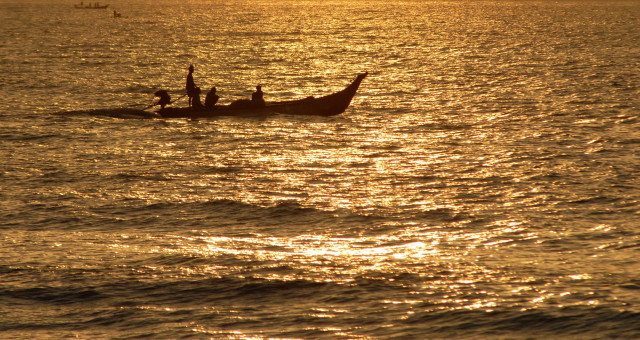Bait fishing: Speakers discuss fishing practices of Sindh, Balochistan
Point out how traditional fishing practices are being replaced by modern yet harmful ones

Point out how traditional fishing practices are being replaced by modern yet harmful ones PHOTO: EPA
This was shared by World Wide Fund for Nature - Pakistan (WWF-P) marine fisheries technical adviser Muhammad Moazzam Khan during a workshop on 'Bait Fisheries Practices and Management in Pakistan'. WWF-P had organised the workshop at the Pearl Continental hotel on Wednesday.
Khan shared an anecdote pertaining to Pakistan's fisheries. He talked about Nearchus, a general of Alexander the Great, who, in his memoirs, talks about people who would only eat fish. He met these people when his forces were passing through the areas that now constitute Makran and other coastal areas in Balochistan.
Khan also shared stories of fishermen dying due to injuries caused by baiting nets and hooks. "There are no medical facilities or proper first aid on the boat when people head out on fishing expeditions," he said. "They do not wear rubber gloves and boots to protect them and often suffer from small injuries. Awareness regarding safety during bait fishing is almost non-existent."
Many fishermen from Balochistan's coastal areas shared their stories and strategies about how to catch good baiting fish and the ways to use bait to catch 'big game' - a term used for a big catch of fish. Two fishermen, Haidar Malik and Abdul Rahim from Balochistan, described the traditional practices used in catching bait.
They stressed the need for protection and promotion of traditional ecological knowledge, which has been proven to protect marine resources.
What is bait fishing?
Bait fishing is done to catch shrimps, crabs, juvenile fish, clams, and other types of baits. It is very important because it helps catch big volumes of fish. Fish are lured by smell, sound, vibration and shape of the bait.
Although artificial baiting objects made of plastic, metals and other materials are used by commercial fisheries to lure fish, the local fishermen of Sindh and Balochistan rely on organic materials like small fish and other marine species to catch bigger fish.
Ahmad Nadeem, the director of Balochistan Coastal Development Authority, made a presentation on bait management for ivory shell fisheries. He also pointed out that use of chicken offal as an attractant has led to environmental degradation in some shallow areas along the Balochistan coast.
Master Abdur Rasheed, representing the Sonmiani Development Organisation, Balochistan, described traditional fisheries in Miani Hor and Kalmat along the Balochistan coast where shellfish and other invertebrates are used as attractants for catching shrimp. This fishery is known as 'chatt', which is used for catching very high-quality shrimp by using sustainable fishing equipment. He further said that the use of these traditional practices is now being replaced by methods employing efficient but harmful fishing equipment.
Published in The Express Tribune, June 18th, 2015.



















COMMENTS
Comments are moderated and generally will be posted if they are on-topic and not abusive.
For more information, please see our Comments FAQ